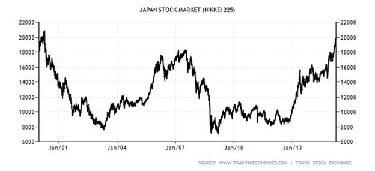Last October, the Japanese government’s national pension system (the GPIF, or Government Pension Investment Fund) made some drastic changes in its asset allocations -- changes that have helped propel the Nikkei 225 stock-market index towards 15-year highs. The GPIF cut its allocation of Japanese government bonds to 35 percent, and raised allocations to foreign bonds and domestic and foreign equities commensurately. Of course, with the world’s most aggressive QE program going on unabated, Japan’s central bank is voraciously buying the bonds that the pension funds want to sell.
The Nikkei Taking Out Long-Term Highs
Now a 2012 law is beginning to come into effect which mandates that other, private pension funds in Japan align their investment strategies with the GPIF by October 2015. They will maintain institutional independence, but will be following the GPIF’s lead -- selling bonds (mostly to the universal buyer, the Bank of Japan) and buying some foreign bonds and many more risk assets.
The GPIF itself has about $1.1 trillion in assets; the three smaller funds that have announced that they will be aligning with GPIF strategy together have about $249 billion. More pension funds are expected to follow suit.
Partly, this is a way for the GPIF and Japan’s other pension funds to achieve the returns they must secure in order to meet the needs of Japan’s growing population of pensioners. Mostly, though, it is part of Shinz? Abe’s plan to boost the stock market and shake Japan out of its long deflationary lethargy.
As we noted above in writing about the slow progress of the Trans-Pacific Partnership, Japan continues to have fundamental structural economic problems. Abe was elected partly on promises to do something about those problems, but the task has proven extremely difficult. Abe faces stiff resistance within the ranks of his own base of supporters to critical reforms of some of Japan’s protected industries and sectors. His reforms were to have “three arrows” -- fiscal stimulus, monetary easing, and structural reform. So far only two have been launched… and we’re not encouraged about his progress in shooting the “third arrow.”
But perhaps it doesn’t matter. If there is one mantra that we have heard over the past 6+ years of “the most hated bull market in history,” it is: Don’t fight the central banks. We are not bullish on a fundamental turnaround and reinvigoration of the Japanese economy; it’s possible, but we’re skeptical. However, as long as the BOJ is doing full-bore QE, and as long as the government is working behind the scenes to influence Japan’s small and large pension funds to buy more stocks, the basic data are positive for Japanese stocks.
Investment implications: We are not fundamentally bullish on Japan. However, we recognize that with massive QE ongoing from the BOJ, and the government leaning on Japanese pension funds to move into risk assets, there are still tailwinds for Japanese stocks. We should also not forget that these pension funds will also be buying foreign stocks -- most likely in the U.S. and Europe.

